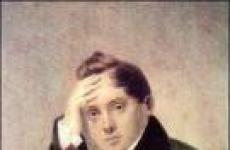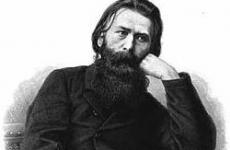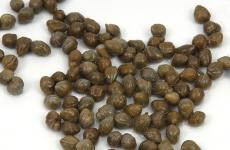Presentation on the topic: “Poetry of the 19th century. The Golden Age of Russian poetry. At the beginning of the 19th century, both classicism and sentimentalism coexist on equal terms in Russian poetry.
Aksakov Ivan Sergeevich (1823-1886) - poet and publicist. One of the leaders of Russian Slavophiles.
Aksakov Konstantin Sergeevich (1817-1860) - poet, literary critic, linguist, historian. The inspirer and ideologist of Slavophilism.
Aksakov Sergei Timofeevich (1791-1859) - writer and public figure, literary and theater critic. Wrote a book about fishing and hunting. Father of writers Konstantin and Ivan Aksakov. The most famous work: the fairy tale “The Scarlet Flower”.
Annensky Innokenty Fedorovich (1855-1909) - poet, playwright, literary critic, linguist, translator. Author of the plays: “King Ixion”, “Laodamia”, “Melanippe the Philosopher”, “Thamira the Kefared”.
Baratynsky Evgeniy Abramovich (1800-1844) - poet and translator. Author of the poems: “Eda”, “Feasts”, “Ball”, “Concubine” (“Gypsy”).
Batyushkov Konstantin Nikolaevich (1787-1855) - poet. Also the author of a number of well-known prose articles: “On the character of Lomonosov”, “Evening at Kantemir’s” and others.
Belinsky Vissarion Grigorievich (1811-1848) - literary critic. He headed the critical department in the publication Otechestvennye zapiski. Author of numerous critical articles. He had a huge influence on Russian literature.
Bestuzhev-Marlinsky Alexander Alexandrovich (1797-1837) - Byronist writer, literary critic. Published under the pseudonym Marlinsky. Published the almanac "Polar Star". He was one of the Decembrists. Author of prose: “Test”, “Terrible fortune-telling”, “Frigate Nadezhda” and others.
Vyazemsky Pyotr Andreevich (1792-1878) - poet, memoirist, historian, literary critic. One of the founders and first head of the Russian Historical Society. Close friend of Pushkin.
Dmitry Vladimirovich Venevetinov (1805-1827) - poet, prose writer, philosopher, translator, literary critic. Author of 50 poems. He was also known as an artist and musician. Organizer of the secret philosophical association “Society of Philosophy”.
Herzen Alexander Ivanovich (1812-1870) - writer, philosopher, teacher. The most famous works: the novel “Who is to Blame?”, the stories “Doctor Krupov”, “The Thieving Magpie”, “Damaged”.
Glinka Sergei Nikolaevich (1776-1847) - writer, memoirist, historian. The ideological inspirer of conservative nationalism. Author of the following works: “Selim and Roxana”, “The Virtues of Women” and others.
Glinka Fedor Nikolaevich (1876-1880) - poet and writer. Member of the Decembrist Society. The most famous works: the poems “Karelia” and “The Mysterious Drop”.
Gogol Nikolai Vasilievich (1809-1852) - writer, playwright, poet, literary critic. Classic of Russian literature. Author: “Dead Souls”, the cycle of stories “Evenings on a Farm near Dikanka”, the stories “The Overcoat” and “Viy”, the plays “The Inspector General” and “Marriage” and many other works.
Goncharov Ivan Aleksandrovich (1812-1891) – writer, literary critic. Author of the novels: “Oblomov”, “Cliff”, “An Ordinary Story”.
Griboyedov Alexander Sergeevich (1795-1829) - poet, playwright and composer. He was a diplomat and died in service in Persia. The most famous work is the poem “Woe from Wit,” which served as the source of many catchphrases.
Grigorovich Dmitry Vasilievich (1822-1900) - writer.
Davydov Denis Vasilievich (1784-1839) – poet, memoirist. Hero of the Patriotic War of 1812. Author of numerous poems and war memoirs.
Dal Vladimir Ivanovich (1801-1872) – writer and ethnographer. Being a military doctor, he collected folklore along the way. The most famous literary work is “Explanatory Dictionary of the Living Great Russian Language.” Dahl worked on the dictionary for more than 50 years.
Delvig Anton Antonovich (1798-1831) – poet, publisher.
Dobrolyubov Nikolai Alexandrovich (1836-1861) - literary critic and poet. He published under the pseudonyms -bov and N. Laibov. Author of numerous critical and philosophical articles.
Dostoevsky Fyodor Mikhailovich (1821-1881) - writer and philosopher. Recognized classic of Russian literature. Author of works: “The Brothers Karamazov”, “Idiot”, “Crime and Punishment”, “Teenager” and many others.
Zhemchuzhnikov Alexander Mikhailovich (1826-1896) - poet. Together with his brothers and the writer Tolstoy A.K. created the image of Kozma Prutkov.
Zhemchuzhnikov Alexey Mikhailovich (1821-1908) - poet and satirist. Together with his brothers and the writer Tolstoy A.K. created the image of Kozma Prutkov. Author of the comedy “Strange Night” and the collection of poems “Songs of Old Age”.
Zhemchuzhnikov Vladimir Mikhailovich (1830-1884) - poet. Together with his brothers and the writer Tolstoy A.K. created the image of Kozma Prutkov.
Zhukovsky Vasily Andreevich (1783-1852) - poet, literary critic, translator, founder of Russian romanticism.
Zagoskin Mikhail Nikolaevich (1789-1852) - writer and playwright. Author of the first Russian historical novels. Author of the works “The Prankster”, “Yuri Miloslavsky, or the Russians in 1612”, “Kulma Petrovich Miroshev” and others.
Karamzin Nikolai Mikhailovich (1766-1826) – historian, writer and poet. Author of the monumental work “History of the Russian State” in 12 volumes. He wrote the stories: “Poor Liza”, “Eugene and Yulia” and many others.
Kireevsky Ivan Vasilievich (1806-1856) - religious philosopher, literary critic, Slavophile.
Krylov Ivan Andreevich (1769-1844) - poet and fabulist. Author of 236 fables, many of which became popular expressions. Published magazines: “Mail of Spirits”, “Spectator”, “Mercury”.
Kuchelbecker Wilhelm Karlovich (1797-1846) - poet. He was one of the Decembrists. Close friend of Pushkin. Author of works: “The Argives”, “The Death of Byron”, “The Eternal Jew”.
Lazhechnikov Ivan Ivanovich (1792-1869) - writer, one of the founders of the Russian historical novel. Author of the novels “The Ice House” and “Basurman”.
Lermontov Mikhail Yurievich (1814-1841) - poet, writer, playwright, artist. Classic of Russian literature. The most famous works: the novel “Hero of Our Time”, the story “Prisoner of the Caucasus”, the poems “Mtsyri” and “Masquerade”.
Leskov Nikolai Semenovich (1831-1895) – writer. The most famous works: “Lefty”, “Cathedrals”, “On Knives”, “Righteous”.
Nekrasov Nikolai Alekseevich (1821-1878) - poet and writer. Classic of Russian literature. Head of the Sovremennik magazine, editor of the Otechestvennye Zapiski magazine. The most famous works: “Who Lives Well in Rus'”, “Russian Women”, “Frost, Red Nose”.
Ogarev Nikolai Platonovich (1813-1877) - poet. Author of poems, poems, critical articles.
Odoevsky Alexander Ivanovich (1802-1839) - poet and writer. He was one of the Decembrists. Author of the poem "Vasilko", the poems "Zosima" and "Elder Prophetess".
Odoevsky Vladimirovich Fedorovich (1804-1869) - writer, thinker, one of the founders of musicology. He wrote fantastic and utopian works. Author of the novel “Year 4338” and numerous short stories.
Ostrovsky Alexander Nikolaevich (1823-1886) – playwright. Classic of Russian literature. Author of plays: “The Thunderstorm”, “Dowry”, “The Marriage of Balzaminov” and many others.
Panaev Ivan Ivanovich (1812-1862) – writer, literary critic, journalist. Author of works: “Mama’s Boy”, “Meeting at the Station”, “Lions of the Province” and others.
Pisarev Dmitry Ivanovich (1840-1868) - literary critic of the sixties, translator. Many of Pisarev’s articles were dismantled into aphorisms.
Pushkin Alexander Sergeevich (1799-1837) - poet, writer, playwright. Classic of Russian literature. Author: the poems “Poltava” and “Eugene Onegin”, the story “The Captain’s Daughter”, the collection of stories “Belkin’s Tales” and numerous poems. Founded the literary magazine Sovremennik.
Raevsky Vladimir Fedoseevich (1795-1872) - poet. Participant in the Patriotic War of 1812. He was one of the Decembrists.
Ryleev Kondraty Fedorovich (1795-1826) - poet. He was one of the Decembrists. Author of the historical poetic cycle "Dumas". Published the literary almanac "Polar Star".
Saltykov-Shchedrin Mikhail Efgrafovich (1826-1889) - writer, journalist. Classic of Russian literature. The most famous works: “Lord Golovlevs”, “The Wise Minnow”, “Poshekhon Antiquity”. He was the editor of the journal Otechestvennye zapiski.
Samarin Yuri Fedorovich (1819-1876) – publicist and philosopher.
Sukhovo-Kobylin Alexander Vasilievich (1817-1903) - playwright, philosopher, translator. Author of the plays: “Krechinsky’s Wedding”, “The Affair”, “The Death of Tarelkin”.
Tolstoy Alexey Konstantinovich (1817-1875) - writer, poet, playwright. Author of the poems: “The Sinner”, “The Alchemist”, the plays “Fantasy”, “Tsar Fyodor Ioannovich”, the stories “The Ghoul” and “The Wolf’s Adopted”. Together with the Zhemchuzhnikov brothers, he created the image of Kozma Prutkov.
Tolstoy Lev Nikolaevich (1828-1910) - writer, thinker, educator. Classic of Russian literature. Served in the artillery. Participated in the defense of Sevastopol. The most famous works: “War and Peace”, “Anna Karenina”, “Resurrection”. In 1901 he was excommunicated from the church.
Turgenev Ivan Sergeevich (1818-1883) - writer, poet, playwright. Classic of Russian literature. The most famous works: “Mumu”, “Asya”, “The Noble Nest”, “Fathers and Sons”.
Tyutchev Fedor Ivanovich (1803-1873) - poet. Classic of Russian literature.
Fet Afanasy Afanasyevich (1820-1892) – lyric poet, memoirist, translator. Classic of Russian literature. Author of numerous romantic poems. Translated Juvenal, Goethe, Catullus.
Khomyakov Alexey Stepanovich (1804-1860) - poet, philosopher, theologian, artist.
Chernyshevsky Nikolai Gavrilovich (1828-1889) - writer, philosopher, literary critic. Author of the novels “What to do?” and “Prologue”, as well as the stories “Alferyev”, “Small Stories”.
Chekhov Anton Pavlovich (1860-1904) - writer, playwright. Classic of Russian literature. Author of the plays “The Cherry Orchard”, “Three Sisters”, “Uncle Vanya” and numerous short stories. Conducted a population census on Sakhalin Island.
The periodization of Russian poetry does not coincide exactly with the boundaries of centuries. Therefore, the list of Russian poets of the 18th century also includes authors who worked at the very beginning of the 19th century, who, to a first approximation, can be characterized as authors... ... Wikipedia
A service list of articles created to coordinate work on the development of the topic. This warning is not set... Wikipedia
Not to be confused with the term "Nazism". The Awakening of Wales, Christopher Williams, 1911. The image of Venus as an allegory of the birth of a nation Nationalism (French nationalisme) is an ideology and policy direction, the basic principle of which is the thesis of a higher... ... Wikipedia
The Silver Age was the heyday of Russian poetry at the beginning of the 20th century, characterized by the appearance of a large number of poets and poetic movements that preached a new aesthetic, different from the old ideals. The name “Silver Age” is given by analogy... Wikipedia
RUSSIAN MAGAZINES. I. NOBLERY MAGAZINES OF THE ERA OF THE FLOWERING OF SERDFASTRY (XVIII century). As in the West, magazines appeared in Russia later than the first printed newspapers. Their appearance was caused by the development of economic and social life and, in connection with... ... Literary encyclopedia
This article is part of a series of articles about the Ukrainian people... Wikipedia
- ... Wikipedia
RUSSIAN LITERATURE. Literature of the late XIX early XX centuries.- The collapse of populism and the struggle between its epigones and Marxism were the most important events in Russian social life at the end of the century and significantly influenced the course of the literary process. The formation of literature reflecting the characteristics of the third... ... Literary encyclopedic dictionary
RUSSIAN LITERATURE OF THE 19TH CENTURY and Lermontov. 1. Lermontov and Russian poetry of the 19th century. L. is the heir of the Pushkin era, who began directly from that milestone, which was designated in Russian. poetry by A. S. Pushkin. He expressed the new position of the letter, characteristic... ... Lermontov Encyclopedia
- ... Wikipedia
Books
- Russian poets of the 19th century. Reader, . The proposed anthology aims to give students of historical and philological faculties and literature teachers the most complete understanding of the development of Russian poetry of the 19th century according to...
- Russian poets of the 19th century. The proposed anthology aims to give students of historical and philological faculties and literature teachers the most complete understanding of the development of Russian poetry of the 19th century according to...
The nineteenth century is called the golden age of Russian poetry. During this period, the classicism beloved by writers was replaced by romanticism and sentimentalism. A little later, realism arose, gradually replacing the idealization of the world. It was in the nineteenth century that literature reached its peak, and the contribution that Russian poets of the 19th century made to this is invaluable. The list of them is really large; among such famous names as Alexander Pushkin, Mikhail Lermontov, Afanasy Fet, there are also little-known but talented Vladimir Raevsky, Sergei Durov and many, many others.
Nineteenth century in literature
The nineteenth century was far from an easy period for Russia: a series of wars over trade routes erupted, Napoleon’s military campaign began, which was then followed by more wars. All this became a huge shock for the country. It was against the backdrop of such events that literature developed. The great Russian poets of the 19th century wrote in their works about love for the motherland, the beauty of Russia, the difficult fate of the common man and the idleness of noble life, they talked a lot about the place of man in this world, about the opposition of the individual to society. Classicism created an image, romanticism elevated it above the dullness of life, sentimentalism surrounded the lyrical hero with stunning landscapes - poetry of the early nineteenth century sought to idealize the world. They used a huge number of tropes, played with foreign words, perfected rhyme - everything to reflect the ideal. Later, realism began to appear, within the framework of which classical poets no longer disdained colloquial expressions and experiments with the form of a poem: the main task was to demonstrate reality with all its shortcomings. The nineteenth century is a century of contradictions; it amazingly combined the ideality and imperfection of the world in which the poets lived.
Ivan Andreevich Krylov (1769-1844)
Krylov laid the foundation for fables in Russian literature. His name is so strongly associated with this genre that it has become something like “Aesop's fables.” Ivan Andreevich chose this form of poetry, unusual for that time, to demonstrate the vices of society, showing them through the images of various animals. The fables are so simple and interesting that some of their lines have become catchphrases, and the variety of topics allows you to find a lesson for any occasion. Krylov was considered a role model by many Russian poets of the 19th century, the list of which would be far from complete without the great fabulist.
Ivan Zakharovich Surikov (1841-1880)
Nekrasov is most often associated with realism and the peasantry, and few people know that many other Russian poets glorified their people and their life. Surikov's poems are distinguished by melody and simplicity. This is what made it possible to set some of his works to music. Here and there the poet deliberately uses words characteristic not of lyricists, but of peasants. The themes of his poems are close to every person, they are far from being as sublime as the idealized poetry of Pushkin, but at the same time they are in no way inferior to it. An amazing ability to demonstrate the life of ordinary people, show their feelings, talk about some everyday situations so that the reader is immersed in the atmosphere of peasant life - these are the components of Ivan Surikov’s lyrics.

Alexey Konstantinovich Tolstoy (1817-1875)
And in the famous Tolstoy family there were Russian poets of the 19th century. The list of eminent relatives was supplemented by Alexei Tolstoy, who became famous for his historical plays, ballads and satirical poems. His works convey love for his native land and praise of its beauty. A distinctive feature of the poems is their simplicity, which gives the lyrics sincerity. The poet’s source of inspiration was the people, which is why his work contains so many references to historical themes and folklore. But at the same time, Tolstoy shows the world in bright colors, admires every moment of life, trying to capture all the best feelings and emotions.

Pyotr Isaevich Weinberg (1831-1908)
Many poets in the nineteenth century were engaged in translating poetry from other languages, Weinberg was no exception. They say that if in prose the translator is a co-author, then in poetry he is a rival. Weinberg translated a huge number of poems from German. For his translation from German of Schiller's drama "Mary Stuart", he was even awarded the prestigious Academy of Sciences Prize. In addition, this amazing poet worked on Goethe, Heine, Byron and many other famous writers. Of course, it is difficult to call Weinberg an independent poet. But in his transcription of the poems, he preserved all the features of the lyrics of the original author, which allows us to speak of him as a truly poetically gifted person. The contribution that Russian poets of the 19th century made to the development of world literature and translations is invaluable. The list of them would be incomplete without Weinberg.

Conclusion
Russian poets have always been an integral part of literature. But it was the nineteenth century that was especially rich in talented people, whose names forever went down in the history of not only Russian, but also world poetry.
Was illuminated by two literary trends - classicism (M. Lomonosov, G. Derzhavin, D. Fonvizin) and sentimentalism (A. Radishchev, N. Karamzin), then romanticism (K. Ryleev, V. Zhukovsky) is already preparing the transition to realism, to the greatest masterpieces of Russian literature of the new century. When approaching this special period for Russian literature, it is important for the teacher to prepare a short introductory story about these directions, designed to make a transition from repeating information about the literature of the 18th century to characterizing the golden age of Russian poetry with the names of the largest Russian poets - Pushkin, Lermontov, Tyutchev, Fet.
Remember Pushkin’s words about V. A. Zhukovsky:
His poems are captivatingly sweet
Centuries will pass the envious distance -
and the words of V. G. Belinsky that Zhukovsky discovered the “America of Romanticism” in Russia. Let us draw the attention of schoolchildren to the fact that Zhukovsky, a wonderful translator, the greatest poet of romanticism, the author of numerous elegies, messages, romances, songs, ballads, an exponent of emotional experiences (longing and sadness, the joy of love, compassion), sought to live as he wrote. “Life and poetry are one,” the poet asserted.
Schoolchildren at this age can already understand Zhukovsky’s judgment that for the poet, the more humane the people, the more humane and happier the state; A person’s happiness is in his soul, and everything beautiful and sublime must conquer, but for this one must despise petty interests, vanity, and strive for the sublime. It is useful to give the task of comparing two works, revealing how the objective world of Derzhavina is replaced by a description of emotional signs and shades in Zhukovsky:
G. Derzhavin. "Nightingale"
On a hill, through a green grove,
At the shine of a bright stream,
Under the roof of a quiet May night,
In the distance I hear a nightingale...
V. Zhukovsky. "Evening"
A stream winding through the light sand,
How pleasant is your quiet harmony!
With what sparkling you roll into the river!..
In Zhukovsky’s descriptions, as in ballads, feeling prevails (remember “Lyudmila”). It is important that schoolchildren understand that Zhukovsky creates a national-historical flavor, folk legends, customs, and a call for humanism and moral beauty prevail.
For the review lesson after the final classes on the 18th century on the topic “Russian poetry of the 19th century”, schoolchildren prepare messages:
About Konstantin Nikolaevich Batyushkov - one of the founders of Russian romanticism, author elegies, messages (“certainty and clarity are the first and main properties of his poetry,” according to V. G. Belinsky), whose poetry is based on the dream of a perfect man;
- about Wilhelm Karlovich Kuchelbecker, the essence of whose romanticism lies in the glorification of heroes who are capable of instilling high civic feelings, as well as about what is interesting about his fate and work;
- about Kondraty Fedorovich Ryleev, the essence of accusatory odes, elegies, messages, poems, whose “thoughts” are in the statement “I am not a poet, but a Citizen” (an expression of civic feelings with the help of broad historical pictures using heroic examples - Susanin, Ermak);
- about the galaxy of Russian lyricists: Baratynsky, Maikov, Fet and etc.
Evgeny Abramovich Baratynsky is the author of poems (“Feasts”, “Ball”, “Gypsy”, etc.), critical articles, but most importantly - lyrical poems. It is important to explain to schoolchildren that according to Baratynsky, “a person is doomed to eternal disappointment”:
The years change us
And with us are our morals;
I love you with all my heart,
But your fun is alien to me...
Ninth-graders are already familiar from previous classes with the poems of Tyutchev and Fet, Maykov and Polonsky, Pleshcheev and Ogarev, so it will not be difficult to prepare short essays and reading one or two poems for such review lessons. Invite them to be creative, think through lessons dedicated to A. S. Pushkin, M. Yu. Lermontov, N. A. Nekrasov.
Students begin their story about Tyutchev by answering the questions: when was the poet born and died? What is especially characteristic of his poetry?
Fedor Ivanovich Tyutchev.
His poetry is characterized by a philosophical understanding of the world. Nature appears before us in constant motion, majestically beautiful and solemnly tragic. Man is involved in the cosmos.
Poet dissatisfied with modernity, in his poems there is a dream of spiritual life, a desire to comprehend Russian reality (“Russia cannot be understood with the mind ...”, “Russian woman”, “Tears”). We read Tyutchev's works, lines of love lyrics, imbued with universal ideas, we see landscapes of our native nature- all these are unsurpassed masterpieces that you always want to return to...
Apollon Nikolaevich Maikov
- “this is a poet-artist, a plastic poet, but not lyricist; a writer remarkable for the masterful finishing of his poems, from his first appearance before the Russian public he became a poet of thought and fearlessly took upon himself all the endless work associated with this title” (A. Druzhinin). The author of poems whose heroes are ordinary people - fishermen, artists, cheerful girls. A close look at the natural world and an accurate transfer of impressions distinguish the most famous works: “Spring! The first frame is being exhibited...", "Oh my God! Yesterday was bad weather...”
Afanasy Afanasyevich Fet
Poet of direct experiences and impressions. “...In his best moments he goes beyond the limits indicated by poetry and boldly takes a step into our region” (P. Tchaikovsky). The desire to express the “inexpressible” tension of hearing and vision, the instantaneity of perception, the change of colors and sounds (“Quiet under the forest canopy...”, “Oh, how it smelled of spring!..”).
Apollo Alexandrovich Grigoriev
Poet, literary and theater critic. Graduated from the Faculty of Law of Moscow university. Began publishing in 1843. He published his only book of poems (1846). Then he turned to large poetic forms. Subsequently he became the leading critic of the Moskvityanin magazine. In the early 1860s, he published critical articles in the magazine of the brothers F. M. and M. M. Dostoevsky “Time”. Known as a memoirist. Author of poems about the conflict of modern man with the prosaic world.
Yakov Petrovich Polonsky
Poet, prose writer. He graduated from the Ryazan gymnasium and studied at the Faculty of Law of Moscow University. He began publishing poetry in 1840. A recognized master of psychological lyrics, who conveyed the inner world of man in its constant inconsistency and variability. He is also known as a prose writer who with all his soul perceives the commoner, the working man, his sorrows, needs, joys (“Reapers”, “Road”, “Challenge”, “Prisoner”).
Alexey Konstantinovich Tolstoy
Poet, playwright, prose writer. He was brought up by A. A. Perovsky (his pseudonym is Antony Pogorelsky). He passed the exam for rank at Moscow University and served as a diplomat. Then he was brought closer to the court. He began to publish as a prose writer. He gained fame for his lyrical poems, historical ballads and the novel “Prince Silver”. The lyrics of A.K. Tolstoy, affirming the value of the earthly world, are imbued with longing for the beautiful and infinite, spilled in nature. He is known as the author of poems, satirical poems, and a wonderful dramatic trilogy (“The Death of Ivan the Terrible,” “Tsar Fyodor Ioannovich,” “Tsar Boris”). The main themes of his poetic works are nature and love (“My bells...”, “You are my land, my native land...”, “If you love, so without reason...”), ballads occupy a special place in his work. (“Vasily Shibanov”, “Prince Mikhailo Repnin”).
A short story can be told about Nikolai Platonovich Ogarev (poems “Prisoner”, “Tavern”). We can briefly talk about Alexei Nikolaevich Pleshcheev - poet, translator, prose writer, memoirist and theater critic. He studied at the school of guards ensigns and cavalry cadets, and then at St. Petersburg University. In his youth, he became close to the circle of M.V. Butashevich-Petrashevsky and, together with F.M. Dostoevsky and other members of the circle, was exiled. He gained literary fame with the publication of his first collection of poems (1846) and until the end of his life he retained his reputation as a poet with a noble and pure direction. Pleshcheev, in addition to poems (“Forward! without fear and doubt...”, “We are brothers according to feelings...”), owns stories, short stories, translations, plays and critical articles.
So, review lessons on the topic “Russian poetry of the 19th century” are preceded by thematic lessons dedicated to Pushkin or Lermontov, Nekrasov, they can be conducted as a montage lesson, or a conference lesson, or a concert lesson (short messages and reading poems). The presenter, naturally, will be the teacher, who has previously distributed the material of stories about poets and poetic texts for reading. The teacher begins the montage, then takes on short comments designed to tie together all the parts, as well as the overall result of such a double lesson; It is appropriate to provide answers to the following sample questions and tasks:
What are the distinctive properties of the poetry of Zhukovsky and Batyushkov?
- What are the features of the creativity of Tyutchev and Fet, Ryleev and Pleshcheev?
- Remember and name the greatest poets of Pushkin’s era.
- Tell us about the life and work of one of the poets of the 19th century.
- Prepare the story “Poetry of the 19th Century.”
Bukhshtab B. Russian poets. - L., 1970.
Gorodetsky B. Russian lyrics: Historical and literary essays. - L., 1974.
Korovin V. Poets of Pushkin’s era. - M., 1980.
Korovin V. Russian poetry of the 19th century. - M., 1987, 1997.
Semenko I. Poets of Pushkin’s era. - M., 1970.
Russian poets: Anthology / Ed. V. I. Korovin. - M., 1990. - Part I.
V. Ya. Korovina, I. S. Zbarsky, V. I. Korovin, Literature 9th grade. Methodological advice - M.: Education, 2003. - 162 p.: ill.
Russian poetry of the 19th century experienced at least three genuine upsurges in its development. The first, relatively speaking, dates back to the beginning of the century and is marked by the name of Pushkin. Another long-recognized poetic rise occurs at the turn of two centuries - the nineteenth and twentieth - and is associated primarily with the work of Alexander Blok. Finally, the third, in the words of a modern researcher, “poetic era” is the middle of the past so far, the 60s, although it is in poetry that the so-called “sixties” chronologically shift more noticeably to the early 50s.
In the 40s, significant and fundamentally important phenomena took place in Russian poetry. Thus, in the mid-40s, Nekrasov’s original creativity took shape, and in the 40s, Fet began to create. And yet, in this decade, in general, poetry fades into the background, which is confirmed by the external picture of literary life: a limited number of published poetry collections, the modest place occupied by poetry in magazines. And the reasons must be sought not only in the arbitrariness of publishers or the lack of aesthetic sense among critics - one CAN point out, for example, a very restrained attitude towards poetry in the second half of the 40s, even among Belinsky. In the literature, analytical tendencies characteristic primarily of prose prevailed. Meanwhile, the attempt made at the very end of the 40s by such a sensitive editor and publisher as Nekrasov to revive interest in poetry seems symptomatic. A whole series of articles devoted to the poetic phenomena of the era is being planned in Sovremennik. Nekrasov’s famous article “Russian minor poets” was written within this framework.
All this was a foretaste of a new rise in poetry, signs of which were already visible from the beginning of the 50s and which by the mid-50s acquired unusual swiftness. Poetry again receives its citizenship on the pages of magazines, becomes a full-blooded and independent participant in the literary process, the subject of critical analysis and theoretical debate. The best critics again write a lot and with interest about it: Chernyshevsky and Dobrolyubov, Druzhinin and Botkin. Poetry collections come out and often become truly outstanding events in literary and social life. First of all, this applies to Nekrasov’s collection of 1856. Books by Fet, Nikitin, Ogarev, Polonsky, Ap. Maykova and others. The era called specifically to poetry, and not to poetry, of which there was never a shortage. The very character of poetry also changes qualitatively. Quite a few new poets are appearing: Sluchevskin, for example, or Nikitin. What is happening, however, is not just an ordinary generational change. The process of becoming poetry looks much more complicated. Characteristic is the revival to a new life of poets who had long been established, but were almost silent in the “non-poetic” 40s. Perhaps the most characteristic in this sense is the fate of a poet like Tyutchev, his kind of double revival: firstly, attention to his very work, which already existed, its revival in the reader’s perception and, secondly, his very extraordinary creative activity . We can talk about a kind of revival even of Nekrasov, who in the 1940s was experiencing a clear creative crisis, wrote little or no poetry (throughout 1849) and directly stated that he was no longer writing poetry. On the other hand, a writer like Turgenev, who created many poetic works in the “prosaic” 40s, completely parted with poetry in the “poetic” 50s.
Russian poetry after Pushkin, it carried opposing principles, expressed the increased complexity and inconsistency of life. Clearly defined and polarized, two directions are developing: democratic and “pure art.” When we talk about two poetic camps, we need to keep in mind the great diversity and complexity of relations both within each of the camps and in the relations between them, especially if we take into account the evolution of social and literary life, “Pure” poets wrote civil poetry: from liberal- accusatory (Ya. Polonsky) to protective (Ap. Maikov). Democratic poets experienced a certain (and also positive) influence from the poets of “pure art”: Nikitin, for example, in his poetry of nature. The flourishing of Khatir poetry is mainly associated with the democratic movement. Nevertheless, “pure art” put forward a number of major satirical talents: N. Shcherbina and especially A.K. Tolstoy, who wrote many satirical works - both independent and within the framework of collective authorship, creating the famous Kozma Prutkov. And yet, in general, there is a fairly clear divide between poetic movements. In the confrontation and confrontation of these two trends, intensified social struggle often manifested itself. The poles could perhaps be designated by two names: Nekrasov and Fet. “Both poets began to write almost simultaneously,” the critics stated, “both experienced the same phases of social life, both made a name for themselves in Russian literature... both, finally, are distinguished by far from ordinary talent, and for all that in poetic there is almost not a single common point in the activities of each of them.”
More often, the Nekrasov school - and here we are talking about just such a school - means poets of the 50s - 70s, ideologically and artistically closest to him, who experienced the direct influence of the great poet, even organizationally united in essence due to that circumstance that most of them were grouped around a few democratic publications: Nekrasov’s Sovremennik, Russian Word, Iskra.






